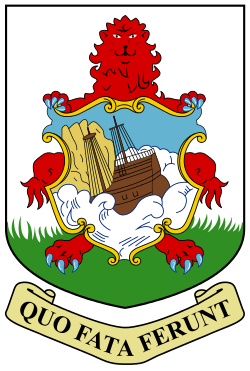Parliament of Bermuda | |
|---|---|
 | |
| Type | |
| Type | |
| Houses | |
| History | |
| Founded | 1 August 1620 |
| Leadership | |
Charles III since 8 September 2022 | |
Rena Lalgie since 14 December 2020 | |
Joan Dillas-Wright, Independent | |
| Structure | |
| Seats | 47 |
 | |
Political groups | His Majesty's Government (25)
His Majesty's Loyal Opposition (11)
|
 | |
Political groups | His Majesty's Government (5) His Majesty's Loyal Opposition (6)
|
| Elections | |
Last election | 18 February 2025 |
| Meeting place | |
 | |
| House of Assembly Building, Hamilton | |
| Website | |
| parliament | |
 |
|---|
| Law |
| Administrative divisions |
The Parliament of Bermuda is the bicameral legislative body of the British Overseas Territory of Bermuda. [1] Based on the Westminster system, one of the two chambers (lower house) is elected, the other (upper house), appointed. [2]
Contents
The two chambers are:
- House of Assembly (36 members; elected for a five-year term in single seat constituencies)
- Senate (11 appointed members)
Originally, the House of Assembly was the only house in the legislature. It held its first session in 1620, making Bermuda's Parliament amongst the world's oldest legislatures and the oldest extant legislature in the Americas. An appointed Privy Council originally performed roles similar to those of an upper house and of a cabinet.
A major constitutional change took place in 1968. The Legislative Council was replaced with an appointed Senate as part of a reorganisation of the Parliament of Bermuda into a bicameral system; Bermuda is the only British Overseas Territory to have such a system. [3] Political parties were legalised, and universal adult suffrage adopted. The position of Premier was also introduced as leader of the ruling party, and an official opposition.
